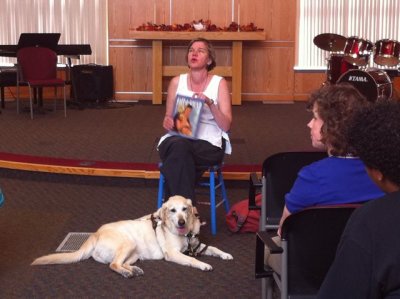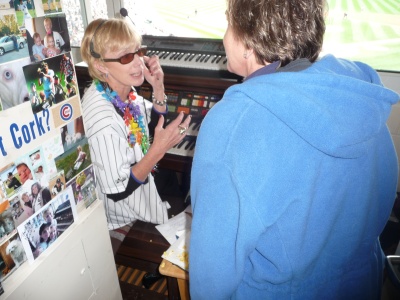Whew! That Youth Literature Festival put on by the College of Education at the University of Illinois the past few days sure kept us busy. Hanni and I visited four classrooms Thursday, three classrooms Friday, and then attended an oo-la-la reception for guest authors Friday night. To cap off the festival, we gave two presentations at the Krannert Center for the Performing Arts yesterday that were open to the entire community.

That's us at Gerber School.
One of the schools we visited Thursday was White Heath Grade School, the only elementary school in town. The school serves 150 kids through the third grade, and After that they’re bussed to schools in nearby Monticello. A plaque in the center of the village boasts that the area was settled by “Mr. White and Mr. Heath.” After one of our presentations there, one girl worried about a dog living in a big city. “Does Hanni like living in Chicago?” she asked.
At Lincoln Trail in nearby Mahomet, a third-grade boy asked what my favorite car was. That question, of course, gave me an opportunity to brag about driving the blue Ford Mustang convertible 80 miles an hour last year. The kids were amazed.
At some school visits, the more courageous (or curious) kids wait to approach Hanni and me with questions until we are gathering up our stuff to leave. After our presentation to middle school kids at Gerber School on Friday, a boy came up and asked if Hanni ever runs away.
Gerber is a school located at the Cunningham Children’s Home in Urbana. Cunningham kids are dealing with a wide range of emotional and behavioral problems, special education needs and learning challenges. The way this boy asked his question, I got the impression he’d tried running away himself once or twice.
I showed him how the Seeing Eye School taught me to loop the leash over my wrist. “That way, if I drop the harness by mistake, the leash is still attached to me, so Hanni can’t get away.” When I’m sitting down or if I know I’ll be standing for a long time, I loop the leash around my ankle. “But even with all those precautions, I still have nightmares where Hanni runs away and I can’t find her.”
I explained to my new pal what a recurring nightmare is, asked him if he ever has those. “Mine’s about a hook,” he said.
”And you know how your heart is racing during the nightmare? You’re really, really scared and then you wake up and look around and figure out it was just a nightmare?” He didn’t say anything. I assumed he was nodding. I went on. It feels so good to know you’re awake,” I said. “You know where you are. You’re safe. Your heart stops racing. You know everything is alright.”
This time, he spoke. “Yeah,” he said. “I know what you mean.”
A girl approached us after our second presentation at Krannert, said her name is Serena, and asked me if going blind made me feel stronger. Wow. That is definitely one question I have never, ever been asked before. I told Serena that, then explained why the question came as such a surprise. “I’m afraid most people think that becoming blind — or having any sort of disability — would make you weak.” Serena disagreed.
“I think it would make you feel like, well, if you could do all this stuff and you are blind, well, you could do anything.” Needless to say, Hanni and I left that room with huge smiles on our faces.
Today Hanni and I are both, ahem, dog tired. But anytime I think about all the kids, teachers, parents, community volunteers, hotel staff, University administrators and donors I met these past four days, and the friends and family members who showed up for Community Day yesterday, well, that big smile lights up my face again. You all make me strong.




![images[2]](https://bethfinke.com/wp-content/uploads/2010/09/images2.jpg)